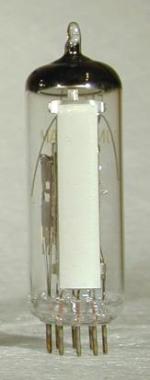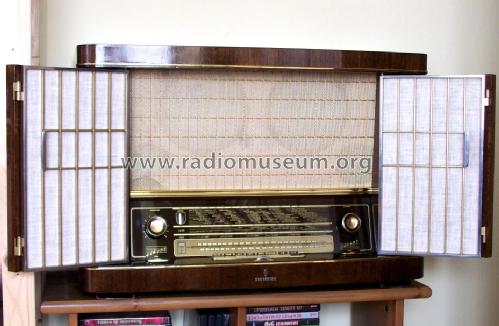How to adapt a 6R-E13 to an EM84 or EM87?
How to adapt a 6R-E13 to an EM84 or EM87?

Attached is a view of a 6R-E13 and the receivers schematics. Attachments:
To thank the Author because you find the post helpful or well done.
Tube replacement, 6 RE 13 by EM 84

I think replacement would be easy, but the EM 84 is not as sensitive as the 6RE13. In a first step I would change nothing, only replace the tube and try whether sensitivity is sufficient ore not.
If you compare both wiring diagrams as contained in "Jogis Roehrenbude" (from where you got your information about the 6RE13, I guess), it seems to me that you might additionally change the 2MOhm (R115) resistor to 470 kOhm. As a third step you could try to increase the input signal. Try to reduce R92 (only for FM). For better AM indication it could be useful to divide R107 (2,2M) into two parts of e. g. 1M and then get the signal voltage after the first 1M resistor. For a better recommendation (active signal amplifier) my experience is not sufficient because I never got this problem before.
Best regards
Rolf
Attachments:
- EM 84 wiring (19 KB)
To thank the Author because you find the post helpful or well done.

I kind of suspected that the EM84 could just be "plugged in". I will see how the EM84 works, before I start playing around with the circuits.
Since I haven't changed the electrolytics and oil caps yet, I will first see if there is still life in the Japanese tube.
To thank the Author because you find the post helpful or well done.
How to adapt a 6R-E13 to an EM84 or EM87?

Hello!
Just have tried an EM84 and EM87 in a Pioneer SX-110. Both need rewiring of the socket, 6R-E13 has different pionout (check SX-110 schematic!).
The EM87 gets better results on AM and FM. Change the 2.2Mohm inside the connector with 100K,
change the pinout and works perfect.
To thank the Author because you find the post helpful or well done.
EM87 or EM84 etc
Those are expensive and getting rare. I usually use the more common Russian or Chinese parts which are usually newer.
| Appearance | Comment |
 |
The Russian 6e1p, are roughly equivalent appearance to 6BR5, EM80, EM81 and similar to EM85. Do check wiring! |
 |
An EM87. The Russian 6e2p and Chinese 6E2 are similar. The 6e3p are more similar to EM84 and 6FG6. Do check wiring! The Chinese tube seems preferable and I have used it in a couple of radios instead of Philips Magic Eye. |
 |
Octal types often can be replaced by Russian 6e5s. See Article on replacing EM34 |
The replacement issues is that heater current may be wrong for series (270mA can be padded to 300mA, but replacing a 200mA series part isn't possible. The parts taking more than 300mA can only be used in parallel feed or adding a transformer. The pin connections may be different (an adaptor can be used to keep radio original). A different sensitivity isn't a huge problem. If it's too sensitive a resistive divider can be used.
I've used 6e5s, 6E2 and 6e1p types. These are available cheaply and in large quantities and often much younger than any EM8x EM3x series part.
To thank the Author because you find the post helpful or well done.
6e1p

According to my experience the diameter of Russian 6e1p is a bit large than in EM80. Depending of the tube placement some minor adjustment may be needed.
Regards
Ake
**
To thank the Author because you find the post helpful or well done.
Size differences
Yes the diameter is slightly more. On my models this didn't matter.
The only actually used "magic eye" I would buy (rather than New Old Stock) would be the DM70 or DM71 (same except wires cropped on DM71) if filament is assured by seller to be good as they don't work the same way and don't seem to fade or burn in as much as EM8x series. The pre EM8x series have a different coating and fade more slowly than the earlier types (Octal, P8 and 6 pin etc) which can fade rapidly in use.
Did anyone ever make a Radio where magic eye only lit when you tuned? I know many turn it off (switch off HT) in "gram"/PU mode.
To thank the Author because you find the post helpful or well done.
Switch for high tension off for EM80

The Siemens "Kammermusik-Schatulle M57" has two doors which have to be opened for tuning.

The left door has a switch which turns off high tension for the EM80 when closed, whereas the right door turns off dial light when closed. Then only the volume control in front middle remains dim lighted.
Regards,
Dietmar
To thank the Author because you find the post helpful or well done.